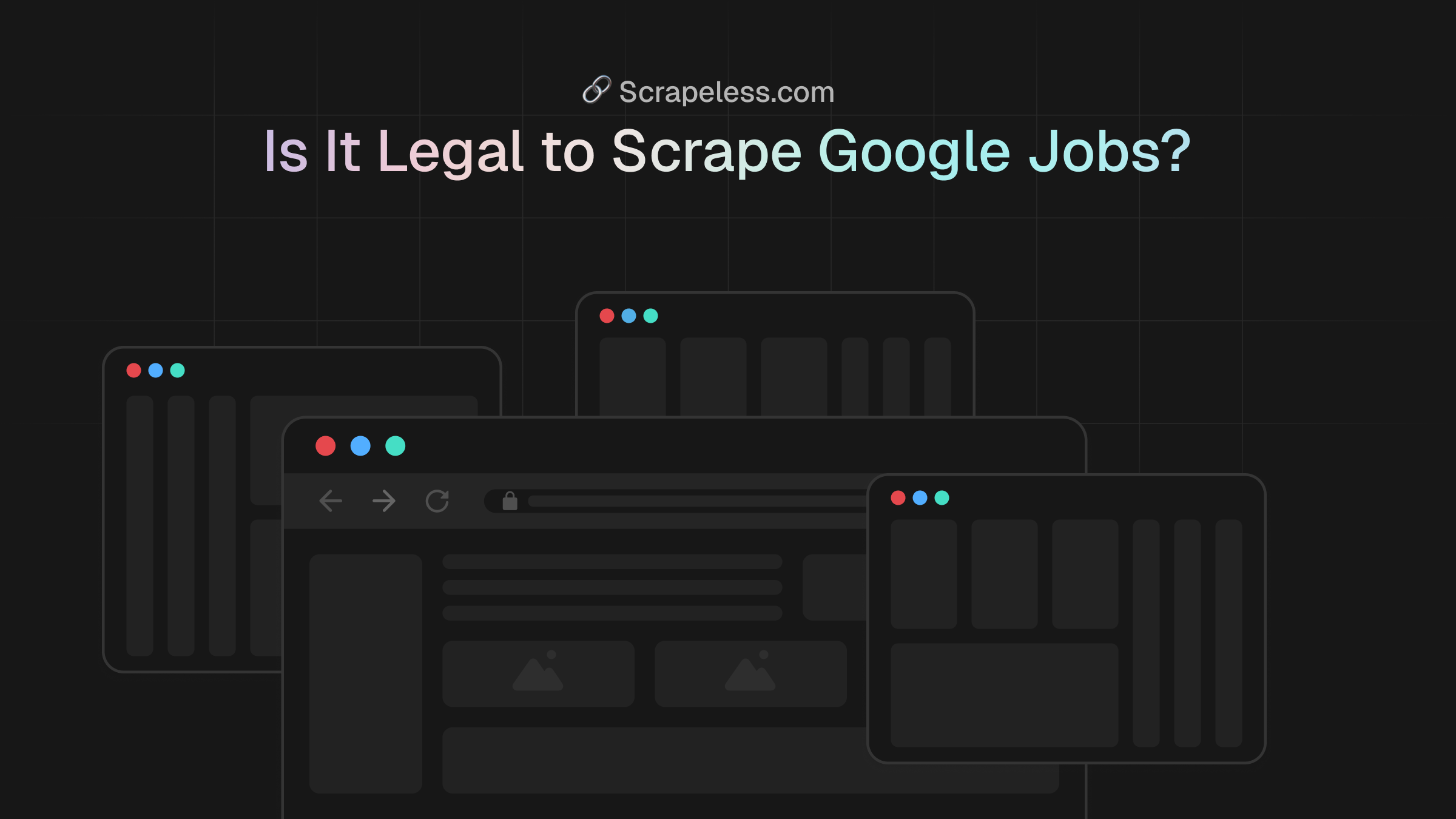Is It Legal to Scrape Google Job?
Senior Web Scraping Engineer
In the realm of recruitment data collection, the practice of scraping job postings from platforms like Google Jobs often raises concerns and discussions about its legality. The US Court of Appeals has ruled that scraping information from publicly accessible sources is not inherently illegal, a stance supported by the Electronic Frontier Foundation. However, the legality of web scraping is still influenced by both platform policies and local laws and regulations.
Generally, collecting publicly accessible information is permissible. However, if scraping activities violate a website's terms of service or relevant laws—such as the U.S. Computer Fraud and Abuse Act (CFAA) or the European Union's General Data Protection Regulation (GDPR)—legal risks may arise. For data scrapers in the recruitment industry, understanding these legal frameworks is crucial. Google Jobs, as a job aggregation platform, has clear terms of service and legal protections that explicitly restrict scraping activities.
In the U.S., if a scraper bypasses Google Jobs' access restrictions or security measures through technical means, it could be deemed a violation of the CFAA. In the EU, the GDPR focuses on protecting personal privacy. Scraping job postings that include candidates' names, contact information, or other personal data significantly increases compliance risks.
This article aims to explore the legal and ethical issues related to scraping job postings while providing practical advice to mitigate risks and ensure compliance. It is important to note that this content is for informational purposes only and does not constitute legal advice. Before taking any action, it is recommended to consult a professional attorney. Neither the author nor the platform assumes responsibility for any consequences arising from this article.
Further Reading: How to Scrape Google Jobs Easily?
Boundaries and Categories of Data Scraping
Understanding the difference between passive and active scraping is key to determining legality. Passive scraping refers to collecting publicly available information without violating a platform's security measures, such as job details on Google Jobs that can be viewed without logging in. Active scraping, on the other hand, involves more complex or even invasive methods, such as simulating fake accounts, bypassing CAPTCHAs, or circumventing access restrictions. These actions often conflict with platform terms of service and may involve legal risks related to data privacy or computer security.
How to Identify Legal and Illegal Scraping?
Scraping publicly available job postings from platforms like Google Jobs is generally permissible if done within reasonable limits. For example, extracting content that does not require authentication and does not bypass technical barriers or violate service agreements typically does not constitute illegal activity. U.S. court rulings have supported the legality of such actions.
However, if scraping involves circumventing a website's protective measures or using illegal methods—such as cracking CAPTCHAs or accessing backend data—it may constitute unauthorized access. Additionally, scraping job postings that include copyrighted content or personal privacy information can lead to legal risks, especially in regions governed by the Digital Millennium Copyright Act (DMCA) or GDPR.
The Impact of Copyright Issues in Job Scraping
It is worth noting that job postings on Google Jobs may contain copyrighted text descriptions. Unauthorized copying and use of such content could lead to copyright disputes. Even if the data is used for analysis or academic research, it is essential to carefully assess whether it falls under "fair use" to avoid infringement.
The Importance of Terms of Service and Platform Policies
Every platform has its own terms of service, and Google Jobs is no exception. Typically, these terms restrict the use of automated tools and explicitly prohibit unauthorized scraping. Therefore, before initiating any scraping activities, it is crucial to thoroughly read and understand the platform's policies to avoid legal liabilities or account suspensions.
Regional Legal Differences and Their Implications
Different jurisdictions around the world have varying legal stances on job posting scraping:
- United States (CFAA): Scraping publicly available data is generally allowed, but bypassing Google Jobs' technical protections may be illegal.
- European Union and UK (GDPR): The focus is on personal data protection. Scraping job postings that include contact information may be illegal.
- France (Loi Informatique et Libertés): Similar to GDPR but with a stronger emphasis on personal data security. Violations can result in severe penalties.
- Canada (PIPEDA): Personal information used in commercial activities must be obtained with consent. Unauthorized scraping may lead to penalties.
- Other Regions: Legal standards vary, with some countries having lenient data protection laws and others being very strict.
Special Legal Risks of Scraping Google Jobs
Compared to traditional job boards, Google Jobs, as a search engine and job aggregation platform, has stricter terms of service and technical specifications. Although the job postings displayed are publicly available, Google explicitly prohibits any unauthorized automated scraping, especially for commercial purposes.
Additionally, the data sources for Google Search and Jobs are complex, with some job postings originating from third-party recruitment websites. This means that when scraping Google Jobs, in addition to complying with Google's rules, one must also be cautious not to indirectly infringe on the copyrights or terms of service of the original posting platforms.
Conclusion
While scraping job postings from Google Jobs is technically feasible, the legal risks cannot be ignored. Whether in the U.S., Europe, or other regions, obtaining recruitment data in a reasonable and compliant manner is essential to avoiding lawsuits and financial losses. For businesses and developers, understanding platform policies, adhering to local laws, and using data responsibly are the keys to sustainable growth.
At Scrapeless, we only access publicly available data while strictly complying with applicable laws, regulations, and website privacy policies. The content in this blog is for demonstration purposes only and does not involve any illegal or infringing activities. We make no guarantees and disclaim all liability for the use of information from this blog or third-party links. Before engaging in any scraping activities, consult your legal advisor and review the target website's terms of service or obtain the necessary permissions.



